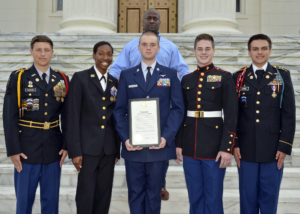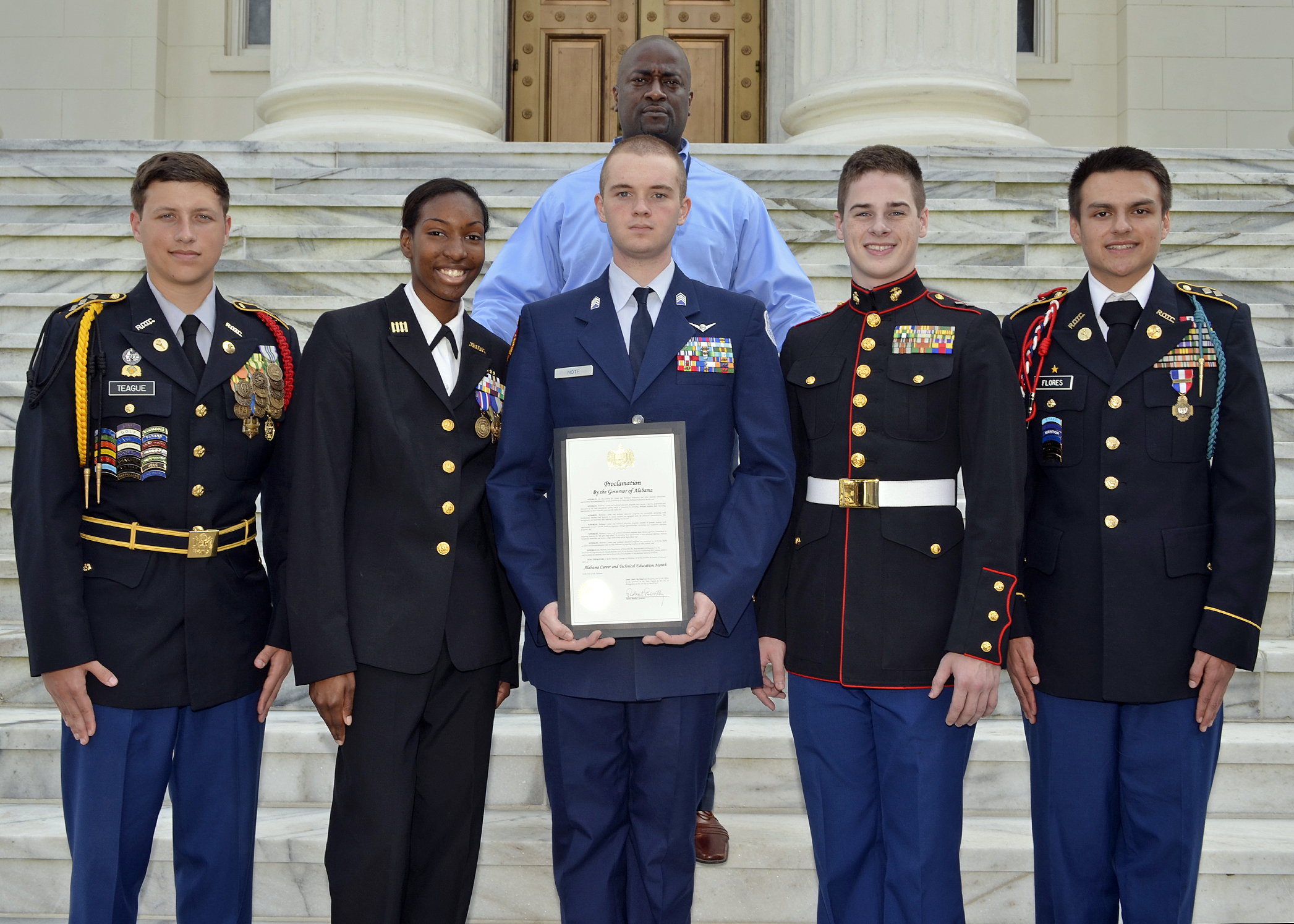High-quality career and technical education (CTE) programs embed collaboration, critical thinking, and global citizenship into their curriculum. These core tenants also make up the work of cadets enrolled in a Junior Reserve Officers’ Training Corps (JROTC) program. CTE and JROTC, alike, center the student experience, with the goal of teaching technical and employability skills. Now, a new national credential — developed with NOCTI — emphasizes the value for students in community connection.
JROTC prepares students to succeed in education and the workforce.
JROTC serves more than 500,000 students in more than 3,500 schools across the United States and overseas. Established as a result of the National Defense Act of 1916, JROTC programs include mentoring and education with an emphasis on employability and life skills, as well as leadership, health, global awareness, and U.S. history. This legislation, alongside the Smith Hughes Act of 1917, prioritized those skills we know to be most critical for success after high school.
The parallels between JROTC and CTE were recently further underscored by the Association for Career and Technical Education (ACTE). ACTE’s New and Related Services (NRS) Division has recognized JROTC leadership pathways as part of the national CTE community. Many states individually also recognize JROTC as part of the Government >amp; Public Administration career cluster. In addition, like CTE students, cadets enrolled in JROTC engage in leadership and learning activities during the school day, after school hours, and at local community activities.
Alabama connects JROTC and CTE.
Alabama emerged as a national leader in the merger of JROTC and CTE. In 2009, the Alabama State Department of Education (ALSDE) formalized this convergence within the career clusters framework. Thus ALSDE guaranteed that JROTC would receive equitable access to federal and state funds earmarked for CTE programs. Between 2009–2013 a JROTC committee was established at the ALSDE with representatives from four service branches. This laid the foundation for the series of steps to come that fully engaged JROTC within the CTE community. Momentum continued when ALSDE acknowledged the JROTC Certificate of Completion as a credential under the Government and Public Administration cluster, officially, in 2014.
As a result of collaborations between the JROTC committee and ALSDE to deliver multifaceted programming, cadets earned physical education as well as career preparedness credits. Further, members across the state began to join the Alabama Association of Career and Technical Education (ALACTE). Once the goal of 75 members was achieved in the summer of 2013, a JROTC section within ALACTE was established.
JROTC and CTE focus on student success.
According to Advance CTE, CTE provides students of all ages with the academic and technical skills, knowledge, and training necessary to succeed in future careers and to become lifelong learners. In total, about 12.5 million high school and college students take CTE courses across the nation. CTE prepares these learners for the world of work by introducing them to workplace competencies and making academic content accessible to students in a hands-on context.
The similarities of CTE and JROTC cannot be overlooked. But while many states recognize JROTC completion certificates for CTE, JROTC certificates don’t necessarily transfer to industry-based credentials. So, in recent years, as states expressed interest in a national credential, JROTC executives began discussing their options with NOCTI. And they emphasized the importance of stakeholder engagement throughout the process.
Nationally recognized credential reflects critical skills.
JROTC executives knew that developing an assessment with an accredited third-party organization would involve an independent verification process. This process was critical for validity of the overall credential program, and for reducing actual or perceived conflicts of interest. Further, NOCTI’s accreditation based on the ISO 17024 standards added additional credibility to the project.
JROTC subject matter experts from the armed services branches and JROTC educators collaborated to establish a common set of standards and competencies. The NOCTI and JROTC collaboration resulted in a Leadership and Employability Skills credential that reflects the critical skills demonstrated by cadets. With this new credential, cadets in JROTC-approved units will benefit from the recognition and verification of learned knowledge and skills. Instructors will benefit by validating student learning, utilizing scoring data for program improvement, and by providing credentialing opportunities for their students. JROTC programs and the schools also benefit from a credential that addresses the evaluation of program quality. The launch of this new credential — and the traction gained for JROTC as a part of the greater CTE community — helps to reinforce the value of the JROTC program.
JROTC prepares students to become better citizens.
The Junior Reserve Officers’ Training Corps also seeks to instill the skills needed for lifelong success, whether the cadets go on to a military career, the workplace, or for additional education. That mission of lifelong success is also a common thread of high-quality CTE programs. Like many other CTE programs, JROTC empowers individuals with confidence and credibility in their knowledge and skills.
“I am proud of those with vision who have welcomed us into the CTE family,” said Ret. Lt. Col. Robert F. Barrow, director of Army instruction, JROTC, at Mobile County Public Schools. “I am optimistic that JROTC will continue to be an invaluable member of CTE for many more years in the future!”

Heidi Speese is division manager at NOCTI.
Ret. Lt. Col. Robert F. Barrow is director of Army instruction, JROTC, at Mobile County Public Schools.
John Foster is president and CEO of NOCTI.







